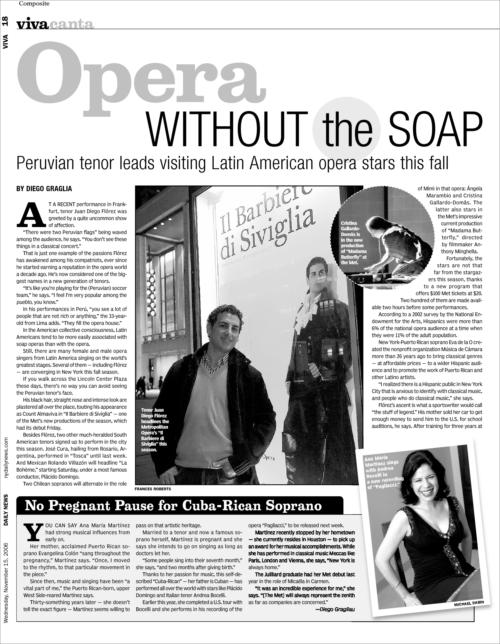At a recent performance in Frankfurt, tenor Juan Diego Flórez was greeted by a quite uncommon show of affection.
“There were two Peruvian flags” being waved among the audience, he says. “You don’t see these things in a classical concert.”
That is just one example of the passions Flórez has awakened among his compatriots, ever since he started earning a reputation in the opera world a decade ago. He’s now considered one of the biggest names in a new generation of tenors.
“It’s like you’re playing for the (Peruvian) soccer team,” he says. “I feel I’m very popular among the pueblo, you know.” In his performances in Perú, “you see a lot of people that are not rich or anything,” the 33-year-old from Lima adds. “They fill the opera house.”
In the American collective consciousness, Latin Americans tend to be more easily associated with soap operas than with the opera.
Still, there are many female and male opera singers from Latin America singing on the world’s greatest stages. Several of them — including Flórez — are converging in New York this fall season.
If you walk across the Lincoln Center Plaza these days, there’s no way you can avoid seeing the Peruvian tenor’s face.
His black hair, straight nose and intense look are plastered all over the place, touting his appearance as Count Almaviva in “Il Barbiere di Siviglia” — one of the Met’s new productions of the season, which had its debut Friday.
Besides Flórez, two other much-heralded South American tenors signed up to perform in the city this season. José Cura, hailing from Rosario, Argentina, performed in “Tosca” until last week. And Mexican Rolando Villazón will headline “La Bohème,” starting Saturday, under a most famous conductor, Plácido Domingo.
Two Chilean sopranos will alternate in the role of Mimì in that opera: Ángela Marambio and Cristina Gallardo-Domâs. The latter also stars in the Met’s impressive current production of “Madama Butterfly,” directed by filmmaker Anthony Minghella. Fortunately, the stars are not that far from the stargazers this season, thanks to a new program that offers $100 Met tickets at $20. Two hundred of them are made available two hours before some performances.
According to a 2002 survey by the National Endowment for the Arts, Hispanics were more than 6% of the national opera audience at a time when they were 11% of the adult population.
New York-Puerto Rican soprano Eva de la O created the nonprofit organization Música de Cámara more than 26 years ago to bring classical genres — at affordable prices — to a wider Hispanic audience and to promote the work of Puerto Rican and other Latino artists.
“I realized there is a Hispanic public in New York City that is anxious to identify with classical music, and people who do classical music,” she says.
Flórez’s ascent is what a sportswriter would call “the stuff of legend.” His mother sold her car to get enough money to send him to the U.S. for school auditions, he says. After training for three years at the Curtis Institute in Philadelphia, he landed a small role at the Rossini Opera Festival in Italy in 1996.
Then a tenor headlining another production got sick. The artistic director couldn’t find anyone to play the difficult part on short notice and asked him –“a perfectly unknown 23-year-old singer”, he says- to do it.
His totally unexpected –and utterly successful- debut earned him an invitation to perform at La Scala in Milan. Ironically, he had visited that high temple of classical music as a tourist just six months before. While taking in the view from one of the balconies, he had promised, “In ten years, I will sing here.”
In those ten years, he has added many more stops to the yearly tours around the world that constitute the life of an opera singer: New York, Vienna, Paris, London, Washington, Tokyo, Berlin, Barcelona.
On Dec. 1, he will make his Carnegie Hall debut in a recital with piano where he will sing Peruvian folk songs in addition to Mozart and Rossini works.
He lives in the Milan area but tries to go back to Peru annually – he is planning a benefit concert for poor children there next year.
Everywhere Flórez goes, Peruvians show up to cheer him. In the U.S., he has been “adopted” by Latinos in general.
“They see me as part of their ‘big country,’” he says. “People feel you are one of them.”
 Every-Night Fever at the Milonga (2007)
Every-Night Fever at the Milonga (2007)  Migrants Suffer in Mexico (2006)
Migrants Suffer in Mexico (2006)  Leaving Wall Street (2006)
Leaving Wall Street (2006)  Torn Up Over Being Torn Down (2004)
Torn Up Over Being Torn Down (2004) 



